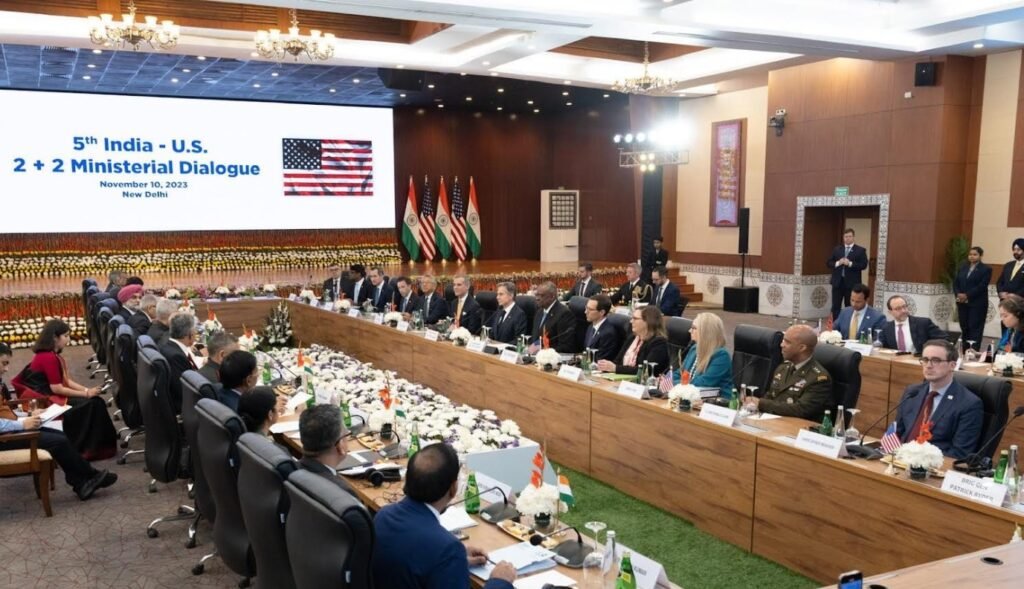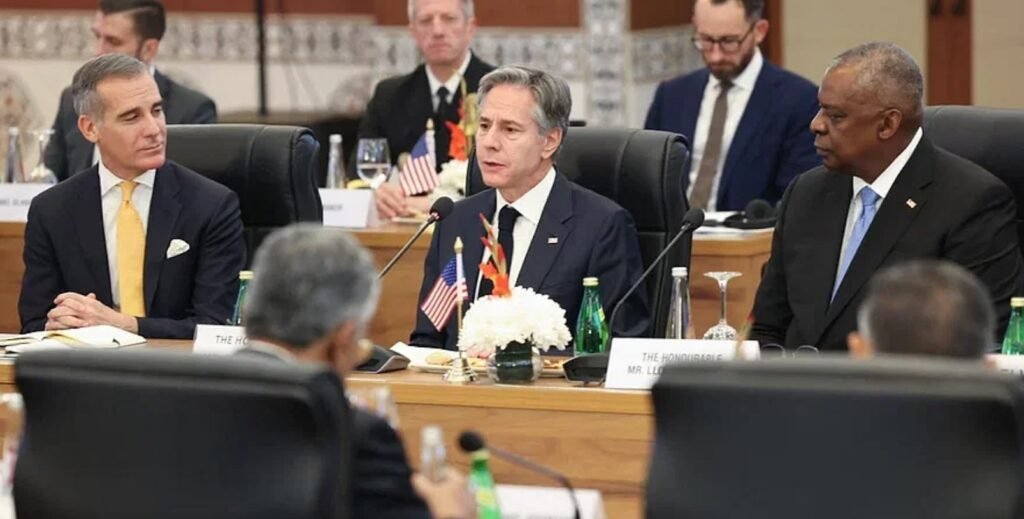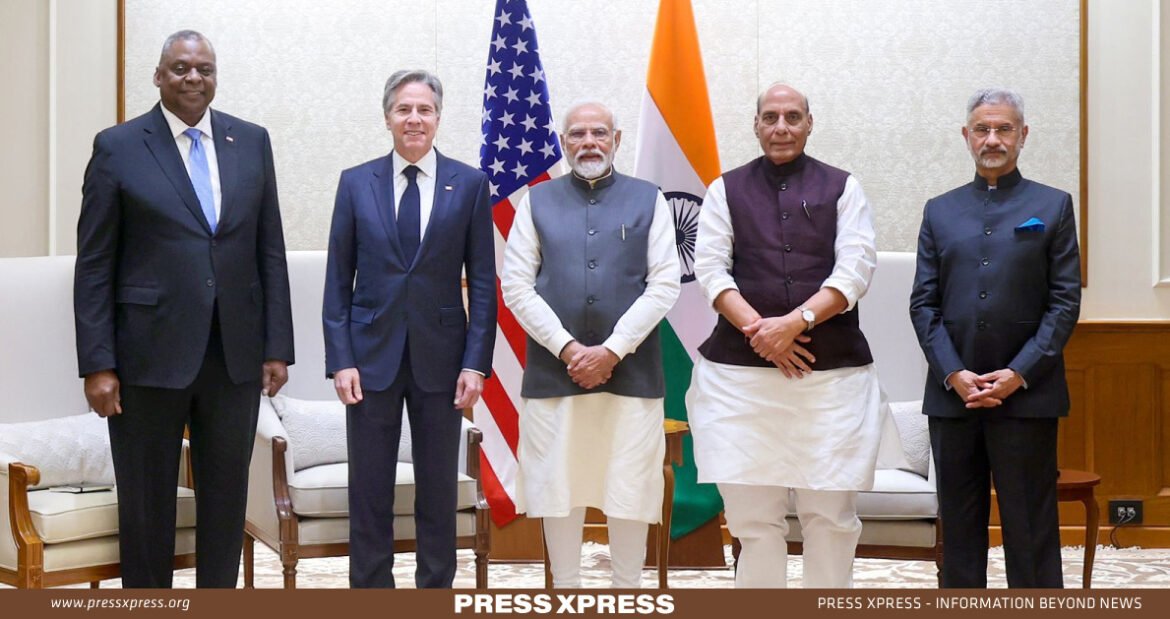In a significant diplomatic move, India recently unequivocally extended its support towards the democratic advancement in Bangladesh during a high-level ‘2+2’ Ministerial Dialogue with the United States. The dialogues, which addressed regional advancements and, in particular, the forthcoming parliamentary elections in Bangladesh, provided insights into a range of regional concerns and areas of emphasis in South Asia.
One of the main participants in the discussions, Indian Foreign Secretary Vinay Mohan Kwatra, underlined India’s unwavering support for democratic movements in Bangladesh. During a press briefing following the dialogue,
Kwatra stated, “We did discuss very extensively regional issues and so far Bangladesh is concerned, we shared our perspective very clearly in the dialogue.”
He further stated, “It is not our (India) space to comment on the policy of a third country. When it comes to developments in Bangladesh, elections in Bangladesh… it is their internal matter and it is for the people of Bangladesh to decide their future.”
The external affairs secretary continued, “We as a close friend and partner of Bangladesh, we respect the democratic processes in Bangladesh and will continue to support the country’s vision of a stable, peaceful and progressive nation, that the people of that country seek for themselves”.
This demonstrates India’s regard for Bangladesh’s sovereignty, and it reflects the attitude of a friendly ally rather than an external influencer.
The meeting was attended by US Defense Secretary Lloyd Austin and his Indian counterpart Rajnath Singh, US State Department Secretary Antony Blinken, and his Indian counterpart S Jaishankar.
U.S. concerns for a sovereign nation’s internal affairs
India has always been a close friend of Bangladesh, and over the last ten years, many energy and connectivity projects have strengthened their relationship. India’s stance is consistent with non-interference principles, whereas the United States has consistently expressed concern regarding the internal political developments in Bangladesh. In light of allegations of electoral malpractices during preceding national elections, the United States has demanded that Bangladesh conduct elections that are impartial, peaceful, and free. The United States issued visa policy concerns in May of this year, following its December 2021 sanctions against the Rapid Action Battalion and seven of its officials. The policy warns that individuals implicated in vote manipulation or election intimidation will be subject to visa restrictions from the United States. The United States demonstrates a proactive stance in the internal affairs of a sovereign nation through the imposition of sanctions and visa restrictions on entities implicated in electoral malpractices.

The external affairs secretary continued, “We as a close friend and partner of Bangladesh, we respect the democratic processes in Bangladesh and will continue to support the country’s vision of a stable, peaceful and progressive nation, that the people of that country seek for themselves”.
Divergence of views among India and USA?
Arindam Bagchi, the official spokesperson for the ministry of external affairs, made an equivalent statement during the ministry’s weekly briefing on Thursday. The reiteration of India’s stance regarding Bangladesh during the 2+2 dialogue suggests the possibility of a cognitive dissonance with the United States, specifically concerning matters pertaining to Bangladesh. The secretary refrained from offering any indication during the briefing regarding the United States’ response to India’s position. He exercised restraint when he stated that India does not provide commentary on the foreign policy of any third country.
The United States’ ongoing apprehensions regarding Bangladesh’s internal matters may intensify diplomatic complexities in the region, while India upholds its dedication to democratic principles and non-interference.

Broader agenda of the 2+2 dialogue:
The recent 2+2 Ministerial Dialogue, which took place in New Delhi, represented the fifth annual gathering of senior officials from the respective foreign and defense ministries of the United States and India. Since its inception in 2018, the 2+2 format has developed into an indispensable mechanism for both nations to expand the reach of their strategic partnership. These gatherings offer an avenue for in-depth deliberations regarding international relations, regional obstacles, and worldwide matters that are of equal importance.
The discussions also encompassed regional concerns, trade alliances, and worldwide obstacles in great detail. Furthermore, the foreign secretary stated that the dialogue extensively covered expanding connectivity initiatives such as the India-Middle East-Europe Economic Corridor, Continuing and Growing Cooperation under the QUAD framework, the Indo-Pacific Partnership, and the potential for India to assume a leadership role in the global south. Additionally, the meeting covered the tense relations between Canada and India. According to Vinay Kwatra, India conveyed its concerns to the United States in a forthright manner.
Lastly, in light of the United States’ concerns regarding Bangladesh, India’s strategic maneuvering demonstrates an alliance with global partners and a commitment to regional stability.


